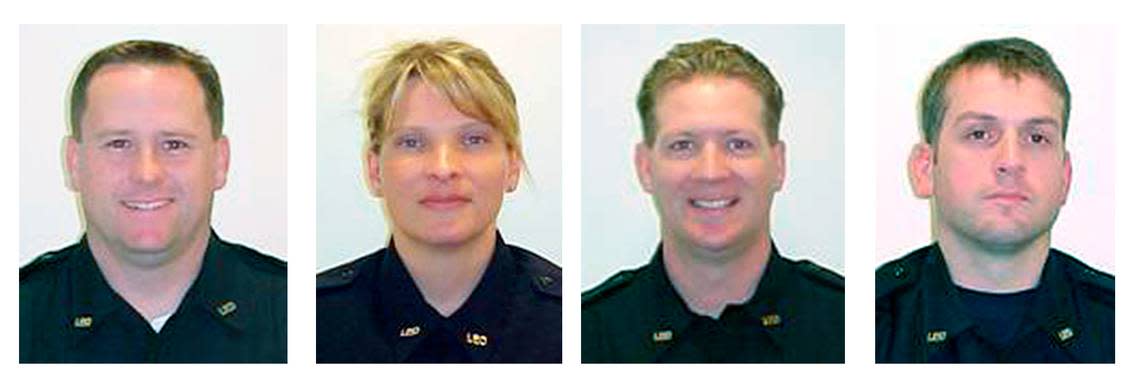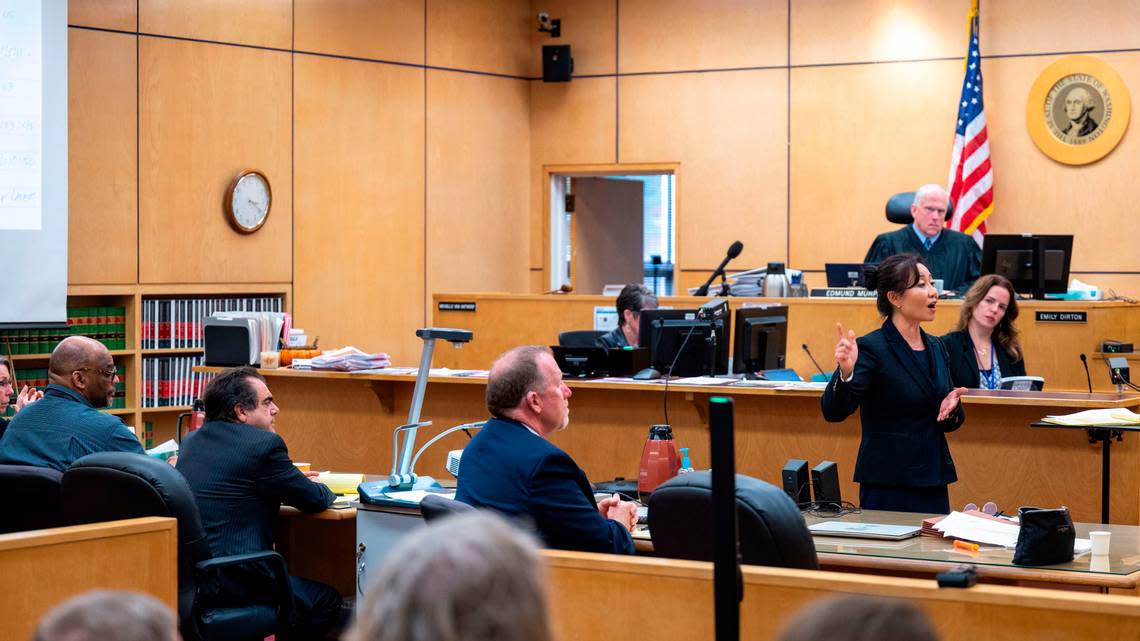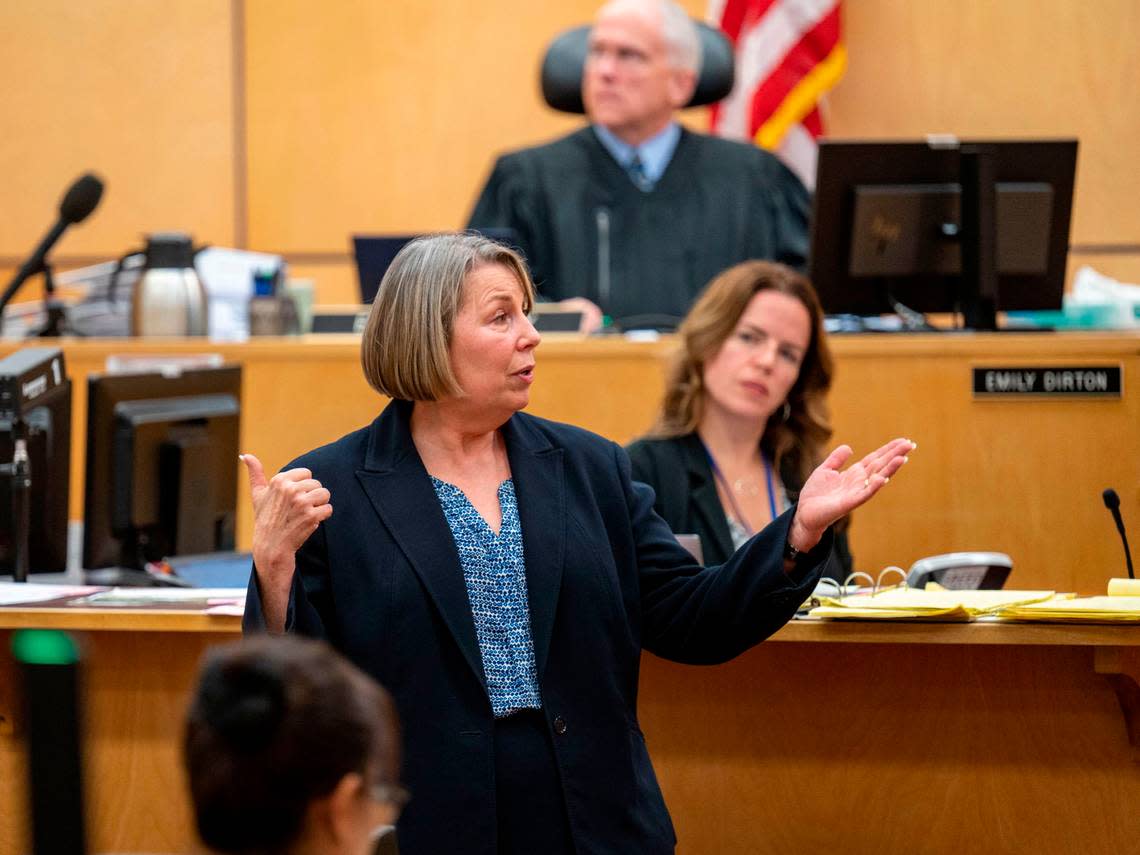Did Dorcus Allen help his boss murder 4 Lakewood cops in 2009? A jury now has the case
A Pierce County jury on Monday heard closing arguments in the second murder trial for a man accused of being the getaway driver in a 2009 shooting at a Parkland coffee shop where four police officers were killed.
Dorcus Dewayne Allen, 51, was first convicted in 2011 of driving his friend and employer, Maurice Clemmons, to and from the shooting. Clemmons was killed after a manhunt, and others accused of aiding him have been sentenced. The case against Allen, also known as Darcus Allen, has continued after the state Supreme Court ruled in 2015 that he did not receive a fair trial.
The court said then that a deputy prosecutor committed misconduct during closing arguments by repeatedly saying Allen “should have known” that Clemmons intended to kill the officers. That was a misstatement of the law, the high court ruled, and the case was sent back to Pierce County Superior Court for a new trial.
More than 11 years after those problematic closing arguments, prosecutors had another chance to convince a jury that over the last four weeks of trial proceedings, they had proved beyond a reasonable doubt that Allen was guilty of being an accomplice to four counts of first-degree murder.
Jurors went into deliberations late Monday afternoon to decide whether Allen is guilty of those charges. If convicted, Allen could face a maximum sentence of life in prison.
According to court records and statements in court, the Nov. 29, 2009 shooting began with Clemmons driving to Allen’s home on Asotin Street at about 8 a.m. in a white pickup truck — usually a work vehicle for Clemmons’ landscaping business. Allen got in the driver’s seat and brought them to Parkland, past the Forza coffee shop where Lakewood Sgt. Mark Renninger and officers Tina Griswold, Gregory Richards and Ronald Owens had gathered. Their patrol cars were outside when the men drove by and pulled into a car wash about a quarter-mile away.
From there, surveillance footage and receipts show Allen went across the street to a gas station, where he got change for the car wash and bought a cigar. Prosecutors said Allen also testified that he used the bathroom. Defense attorneys previously said that it was during this trip across the street that, unbeknownst to Allen, Clemmons walked to the coffee shop, killed four police officers and walked back to the truck.

Prosecutors said in opening statements that, based on the timing of when the pickup entered and exited the car wash, it wasn’t possible that Clemmons walked to the coffee shop and back before Allen returned from across the street, so he must have been dropped off by the defendant. On Monday, prosecutors focused on convincing jurors that Allen knew about the plan long before they started driving to Parkland that morning.
Deputy prosecutor James Schacht pointed to cell phone records showing calls between Allen and Clemmons in the week leading up to the shooting and a Thanksgiving dinner the defendant attended where Clemmons, according to testimony, described wanting to kill police officers.
He also showed jurors the GPS device Clemmons cut off his leg in an earlier plan to draw police to his home to shoot. Schacht said Allen knew about the plan, and the device was found plugged in inside the defendant’s garage.
“The defendant knew what was going to happen because he had been part of it during the course of that week,” Schacht said. The phone records are part of the evidence, the GPS is part of the evidence… And the only thing the defendant said in response when we had it all up was that no, no, this was just a spur of the moment thing. Clemmons just decided when we went past those police cars that this was the time to do it.”

For the better part of two hours, Schacht repeatedly called Allen’s credibility into question, citing inconsistencies between Allen’s statements to police and his testimony on teh stand and audio clips from police interviews to show how Allen “shifts gears” when confronted with the fact that police knew he was at the car wash that morning. He also cited a statement Allen made about where he eventually got out of the pickup truck after the shooting. Schacht said Allen admitted in testimony that he lied to police about where he got out and hopped on a bus.
“The defendant was showing through his actions that day that he was exercising caution to keep from being caught,” Schacht said.
In response, Allen’s defense attorney, Mary High, said prosecutors were relying on suspicions and innuendo to convince jurors to infer that the defendant is guilty. She pointed out that records of phone calls between Allen and Clemmons were made on work phones, and the actual content of the calls is unknown.
From the defense’s perspective, the only time Allen could have had time to form a plan with Clemmons was when the two drove by the coffee shop and saw Lakewood police cars outside. High asked jurors to consider what circumstances suggest innocence rather than guilt, such as the fact that the pickup truck wasn’t left running, and that Allen didn’t hide his face inside the gas station across the street.
“The state would have you believe you should infer guilt rather than the presumption of innocence, and that he went into the ampm with some big plan to get his face on every camera,” High said.

The defense attorney also returned to the Thanksgiving dinner where Clemmons is said to have gone on a tirade about wanting to kill police. The defense attorney said that it was Allen who the family turned to, asking him to talk with Clemmons and be a voice of reason.
High asked jurors to turn their attention to the evidence of the case, and she reminded them that reasonable doubt can arise from a lack of it. She said there was no physical evidence that actually tied Allen to the shooting itself, and no witnesses reported seeing Allen drop Clemmons off at the coffee shop.
“Take a hard look at the real evidence, not innuendo, not conspiracy theory, not supposition,” High said. “He’s had 13 years of hell. Let’s end it now.”
